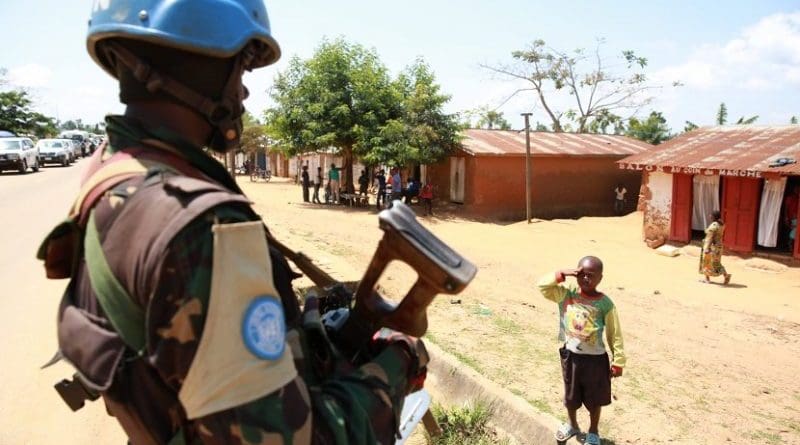DR Congo And The Conundrum Of UN Peacekeeping – Analysis
By Javier Delgado Rivera
A December 7 attack on the UN peacekeeping mission in the Democratic Republic of the Congo (DRC) left 14 Tanzanian peacekeepers dead and 53 injured. This incident – the worst killing of blue helmets in 24 years – will intensify the debate around the multiple flaws and challenges that prevent blue helmet operations from bringing peace and stability wherever they are deployed.
The UN mission in DRC (MONUSCO in its French acronym) is the UN’s biggest peacekeeping operation with more than 22,000 personnel among soldiers, police, and civilians. However, as acknowledged by the peacekeeping chief and a top-ranking UN official, the mission is constrained by inadequate resources. “A force of 16,000 peacekeepers cannot alone bring peace to a country the size of Western Europe,” lamented the two UN leaders.
The troops killed a few days ago bring MONUSCO’s death toll to 24 this year. Such a high number of casualties is the result of the worsening situation on the ground, the mission’s onerous mandate, as well as insufficient and ill-suited equipment. On the day of the incident, UN helicopters took more than 12 hours to respond to the assistance calls made by the Tanzanian peacekeepers. The reason cited for the delay was ‘bad weather,’ an impediment that could have been overcome with more advanced air support.
With a budget of $1.14 billion for 2017/18, MONUSCO is also the world’s most expensive peacekeeping operation in spite of a recent 8 percent cut following considerable US pressure. As a result, the mission’s head was asked to revise staffing, slash fuel costs, and streamline aircraft use.
Shifting battlefields
The armed group suspected of being behind the attack in early December, the Allied Democratic Forces, is an Islamist fundamentalist movement originally established in Uganda.
The nature of the attackers brings to light a major challenge encountered by many ongoing peacekeeping operations: how to respond to shadowy terrorist and insurgent groups that undermine security across Africa and the Middle East, as opposed to conventional warfare between well-defined sides. “Faced with asymmetrical violence, peacekeeping missions experience [new] difficulties to the point that they are sometimes forced to dedicate their resources to their own security,” noted Moussa Faki Mahamat, the African Union’s Commission Chairman.
Nevertheless, there is broad consensus among UN member states that peacekeeping missions should not be mandated to conduct military counterterrorism operations because they are not suited to do so – for instance, the blue helmets lack robust intelligence capacities.
The evil within
But it is not the emergence of asymmetric threat environments what, in the eyes of many people, erodes the blue helmets’ appeasing efforts across the world. For two decades now, UN peacekeeping has been marred by allegations and charges of sexual abuse in countries like in the DRC, the Central African Republic, Haiti, and Liberia.
In MONUSCO alone there have been 25 reported cases of sexual abuse and exploitation involving peacekeepers this year. More than 2,000 allegations have been recorded from 2004 to 2016 in peacekeeping operations worldwide. “Where poverty is rife, the promise of a bar of soap and some food was often enough to entice a teenager, let alone promises of marriage and security,” stresses Sanam Naraghi-Anderlini, former gender adviser to the UN.
These incidents not only denigrate the lives of the very people peacekeepers are supposed to protect, but also taint the reputation of the UN system as a whole. To help address the harm already done, the UN chief appointed in August the first UN advocate for the rights of victims of sexual exploitation and abuse.
For all its flaws, UN peacekeeping should be given credit for restoring a degree of stability in some of the world’s hotspots like Cambodia in the early 90s and more recently in Sierra Leone, Liberia, and Ivory Coast.
Yet when it comes to bringing stability to the world’s most troubled hotspots, the UN Security Council – the organ that, with the consent of the host country, authorizes and tasks blue helmet operations – is often carried away by an unrealistic vision of what peacekeepers can achieve in the ground.
Last week’s attack in DRC will trigger a debate in UN circles about how to better define peace missions’ objectives and strategies, as well a serious evaluation on how to strengthen their response mechanisms. Troop and policy contributor countries will also demand further assurances that their countrymen and women are not unnecessarily put in harm’s way when operating in one of the UN’s 15 peacekeeping missions.
“For decades, [our approach to peace and security] has been dominated by responding to conflict. For the future, we need to do far more to prevent war and sustain peace,” said António Guterres during his first speech to the Council as new UN chief.
After the deadly incident of a few days ago, many will wonder how the world body intents to prevent conflicts from erupting worldwide when it struggles to keep its troops safe in the battles it is already engulfed in.
The opinions, beliefs, and viewpoints expressed by the authors are theirs alone and don’t reflect any official position of Geopoliticalmonitor.com.

